|
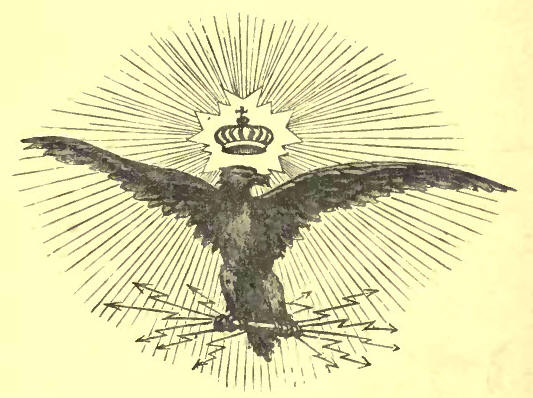
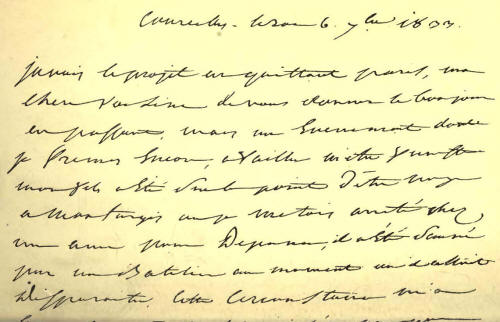
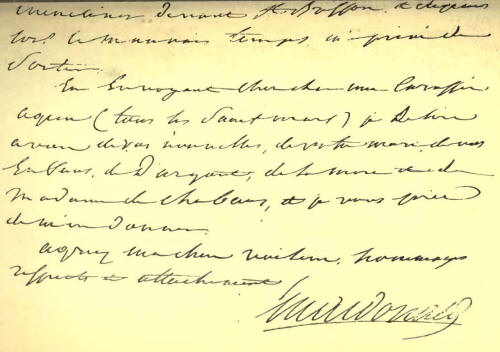
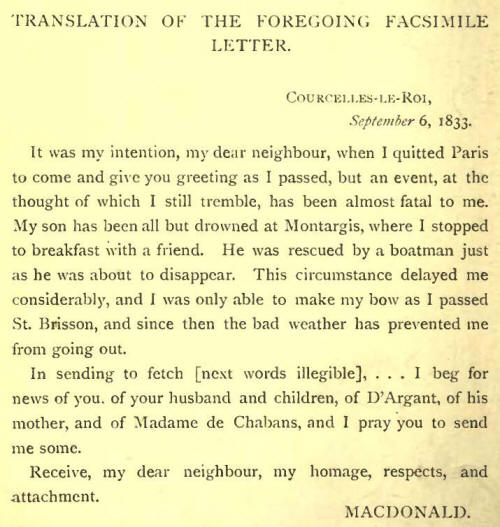
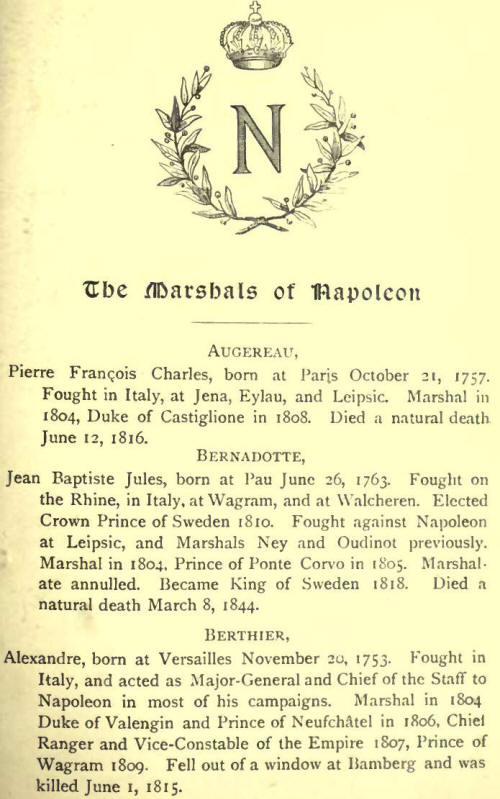
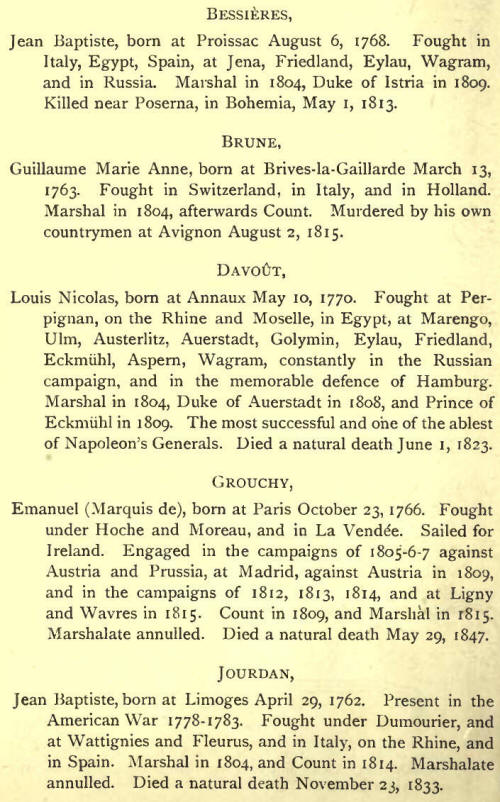
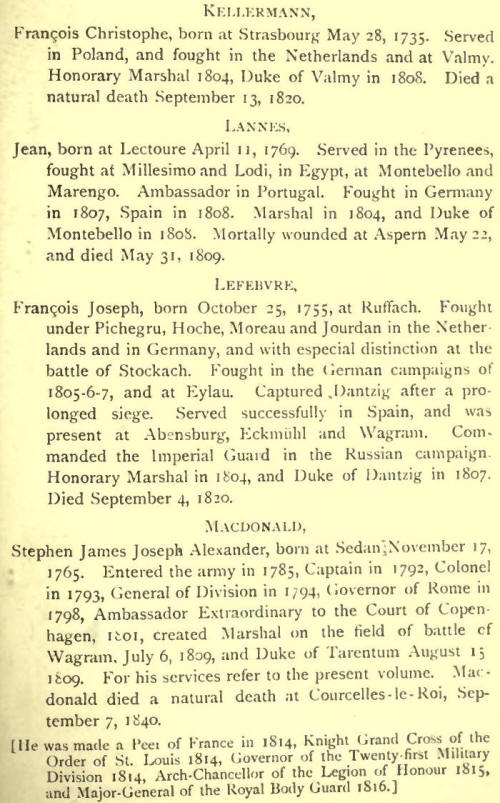
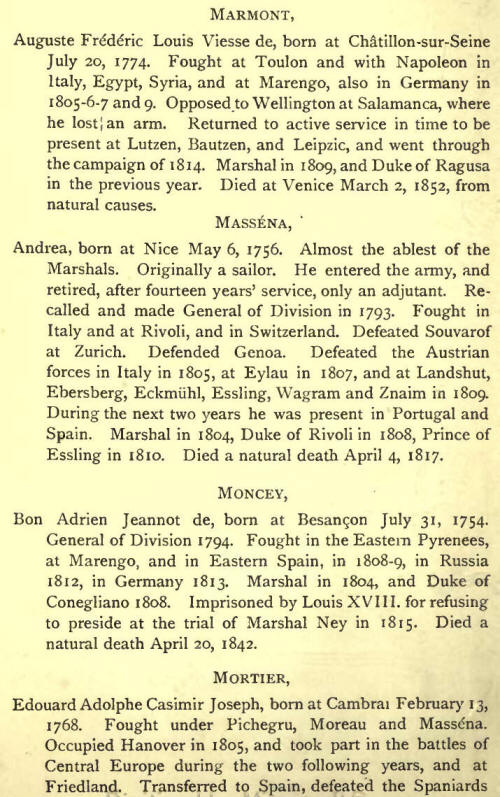
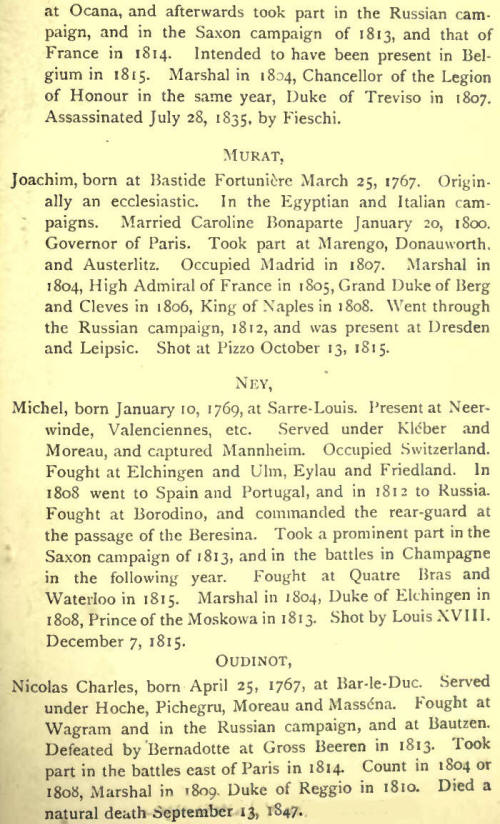
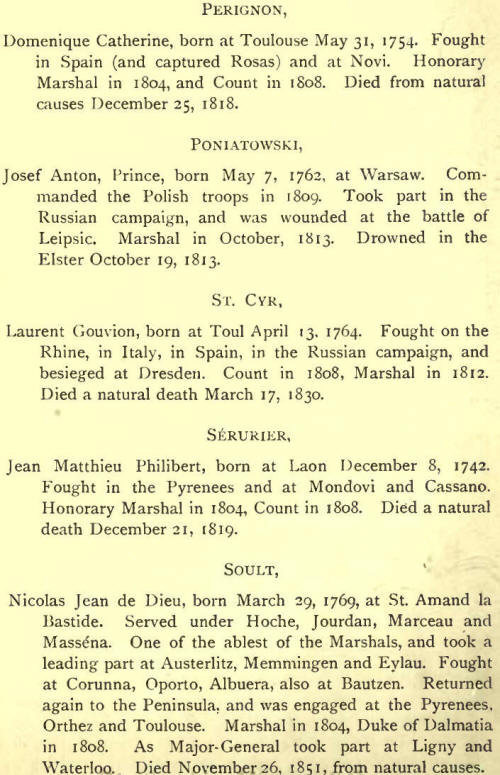
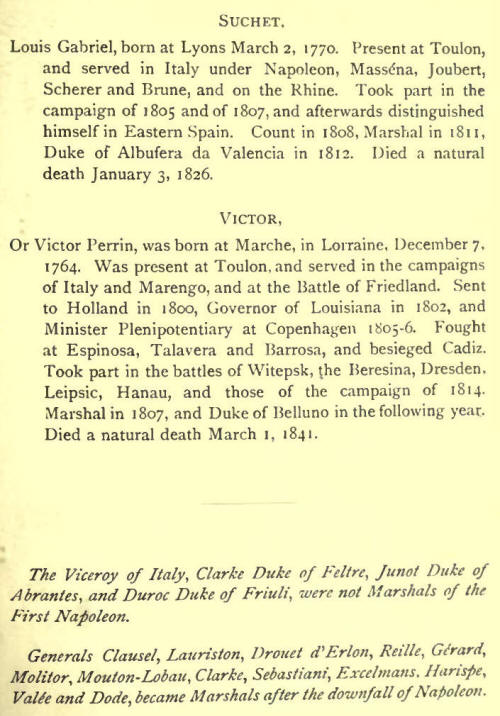
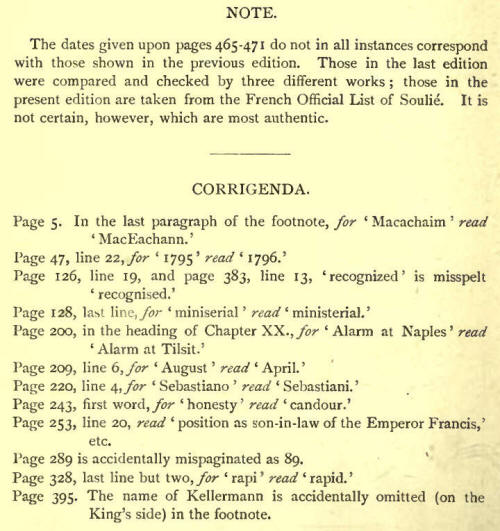
NOTES
(These Notes are not included in the Index.)
GENERAL MACDONALD'S PASSAGE OF THE ALPS.
(Pagee 122.)
MACDONALD modestly gives
so slight an outline of his exertions on this occasion that it is right
to subjoin a few extracts on the subject from General Mathieu Dumas's
'Recollections':
'In my first
communications with my new General-in-chief, I foresaw how easy and
agreeable I should find the duties that I had to perform about him;
easy, because his foresight and activity left nothing to the Chief of
his Staff, besides the care of well directing the execution of orders,
always precise, always clearly expressed; and agreeable, because his
frank and military manner was tempered and set off by a tone of the most
pleasing urbanity, and by lively and instructive conversation, which
invited and inspired confidence. An unerring coup-d'aeil, prompt
resolution, much boldness and perseverance under the most trying
circumstances, are the principal traits of character which General
Macdonald manifested in this campaign.
'Being directed to open
the march, I proceeded to Tusis, at the foot of the glaciers, with
General Verrières, whom General Sorhier, commander of the artillery, had
detached to prepare, under my direction, the roads for the passage and
the means of conveyance. We arrived at 'l'usis on November 24, preceded
by three companies of sappers, whose labour could not render the road
beyond that village passable for carriages. All those of the artillery
were taken to pieces and placed upon sledges of the country, which were
narrower and lighter than those which we had had made. These sledges
were drawn by oxen ; the ammunition was loaded on the backs of mules;
and as these means of conveyance, collected with so much difficulty,
were still very insufficient, I gave orders to distribute to every
soldier—already overburdened with the weight of his arms—his knapsack
and his provisions for five days, ten packets of cartridges, besides the
ordinary supply in the cartouche.
'On November 27, the
weather appearing calm, I caused the column of cavalry to march, and to
attempt to ascend the glacier of the Splugen. I had assembled the most
experienced guides, who preceded the column, and set up poles to mark
the way. The workmen who followed them swept away or trod down the snow.
General Laboissière and myself encouraged them ; they advanced with
difficulty. The day was on the decline, and the column had scarcely got
half-way up the mountain when the cast wind suddenly rose. The guides
and the workmen struggled on amidst clouds of snow and pulverized ice.
'An enormous avalanche
loosing itself from the highest summit, rolling with a fearful noise,
and gliding with the rapidity of lightning, carried off thirty dragoons
at the head of the column, who, with their horses, were swept away with
the torrent, dashed against the rock, and buried under the snow. I had
just quitted General Laboissière, and was engaged in making the column
more close. I was not above one hundred and fifty paces from the spot,
and thought for a moment that the General and the officers who
accompanied him had likewise been swept away by the avalanche; but I
perceived them, with some dragoons and the guides, beyond the mass of
snow, pursuing their way.
'I stopped the rest of
the column, and made it fall back to the village. General Laboissiere,
finding himself in advance, separated from his troops, and almost alone,
had no hope of safety but by reaching the summit of the mountain. He
succeeded by the assistance of some vigorous countrymen, who conducted
him to the hospital. Some of the dragoons who had been swallowed up by
the avalanche were also extricated by the brave mountaineers.
'This fruitless attempt
only doubled the ardour of the French. The remainder of the company of
dragoons which had suffered so severe a loss desired again to form the
head of the column, under the command of its Colonel (Cavaignac); but
the hurricane continued three days with the same violence. The
avalanches had in several places blocked up the path; the guides
declared that the passage was entirely closed, and that with the
greatest exertions it would not he possible to open it in less than a
fortnight, and then only for the infantry.
'The General-in-chief
persisted in passing. The labourers of the country, the sappers of the
army, and the grenadiers, after six hours' excessive labour, reached the
summit; but finding between the glaciers a considerable accumulation of
snow, over which the guides would not venture, all retreated, crying
that the passage was closed up. General Macdonald, accompanied by
Generals Sorbier and Pully, stopped them, brought back the grenadiers to
the trace of the path, rallied the workmen and the guides, and himself
sounding first of all, he made them pierce and clear away these walls of
snow, in which many men were entombed.
''l'he storm was dreadful
in the passage to the hospital, and on the plateau as far as the
Cardinel ; the column was several times divided ; the 104th demi-brigade
was almost entirely dispersed, and could not he rallied till two days
afterwards. General Rey, with the reserve, closely followed the steps of
General Macdonald; but General Vandamme, who was at some distance in the
rear, could scarcely find any traces of them. He would have been obliged
to give up all thoughts of passing if his workmen and soldiers,
discouraged by dangers in appearance less glorious than those which they
were accustomed to brave in battle, had not been supported by the
example of their comrades, who had been animated by that of the
Commander-in-chief.
'This last day alone cost
about a hundred men, who were lost in the snow or frozen to death during
the march. Above a hundred horses and mules likewise perished, and many
sledges were abandoned. Articles belonging to the artillery and camp
equipage were picked up after the tempest. At length, on December 6, all
the troops and the greater part of the artillery had passed the Splügen,
and the headquarters were fixed at Chiavenna.'—General Count Mathieu
Dumas's ' Memoirs of his own Time,' vol. ii., c. 162. (London: Bentley,
1839.)
THE EMPEROR NAPOLEON'S
RETURN.
(Page 399.)
THE following is a
contemporary account of the arrival of Napoleon at Fontainebleau in
March, 1815
'The number of national
guards, volunteers, and other troops, collected at Melun to stop the
march of Buonaparte, was not less than 100,000 men. The best spirit
seemed to prevail amongst them. They appeared devoted to the cause of
the King, and eager to meet and repel his antagonist. A powerful
artillery strengthened their positions. Relying on their numbers, they
had left the town, the rocks, and the forest of Fontainebleau unguarded,
preferring the flat plains of Melun, where the whole of their army might
act at once against the comparatively small band of the invader.
On the 19th Buonaparte
reached and occupied Fontainebleau without the least opposition. He had
at that time with him only 15,000 veteran troops; but other divisions
were either following him or advancing to 'support his right and left
flanks on parallel lines of march.
'Ney, whose corps is
stated to have amounted to 30,000 men, had previously communicated to
the Court a declaration signed by the whole army under his command, both
officers and privates, in which they stated "that they respected him too
much to deceive him; that they would not fight for Louis XVIII.; but
that they would shed all their blood for Napoleon the Great." This
declaration did not entirely extinguish the hopes of the Bourbons. They
still relied on the good disposition and numbers of the troops at Melun,
and blinded by the addresses sent UI) from many garrisons and provinces
at the very moment of their defection, still thought that their cause
would be espoused by the nation as her own.
'Early on the morning of
Monday, the 20th, preparations were made on both sides for the encounter
which was expected to take place. The French army was drawn up en étages
on three lines, the intervals and the flanks armed with batteries. The
centre occupied the Paris road. The ground from Fontainebleau to Melun
is a continual declivity, so that, on emerging from the forest, you have
a clear view of the country before you, whilst, on the other hand, those
below can easily descry whatever appears on the eminence.
An awful silence, broken
only at times by peals of martial music, intended to confirm the loyalty
of the troops by repeating the royal airs of Vivc Henri ("Quatre" and cc
La Belle Gabrielle," or by the voice of the Commanders- and the march of
divisions to their appointed ground, pervaded the King's army. All was
anxious expectation; the chiefs conscious that a moment would decide the
fate of the Bourbon dynasty, and the troops, perhaps, secretly awed at
the thought of meeting in hostility the man whom they had been
accustomed to obey. On the side of Fontainebleau no sound as of an army
rushing to battle was heard. If the enemy was advancing, his troops
evidently moved in silence. Perhaps his heart had failed him, and he had
retreated during the night if so, France was saved and Europe free.
'At length a light
trampling of horses became audible. It approached; an open carriage,
attended by a few hussars and dragoons, appeared on the skirts of the
forest. it drove down the hills with the rapidity of lightning; it
reached the advanced post. "Vive l'Empereur !" burst from the astonished
soldiery. "Napoleon !—Napoleon the Great !" spread from rank to rank;
for, bareheaded, Bertrand seated at his right, and 1)rouet at his left,
Napoleon continued his course, now waving his hand, now opening his arms
to the soldiers, whom he called "his friends, his companions in arms,
whose honour, whose glories, whose country he now came to restore." All
discipline was forgotten, disobeyed, and derided ; the
Commanders-in-chief took to flight; thousands rushed towards Napoleon;
acclamations rent the sky. At that moment his own Guard descended the
hill, the Imperial March was played, the eagles were once more
exhibited, and those whose deadly weapons were to have aimed at each
other's life embraced as brothers, and joined in universal shouts. In
the midst of these greetings did Napoleon pass through the whole of the
royal army, pursuing his course to Paris, and arrived at eight o'clock
in the evening at the Tuileries. It was not until the next morning that
his arrival was generally known. He is said to have left his army behind
him at Fontainebleau.'—The Gentleman's Magazine, March, 1815, P. 267.
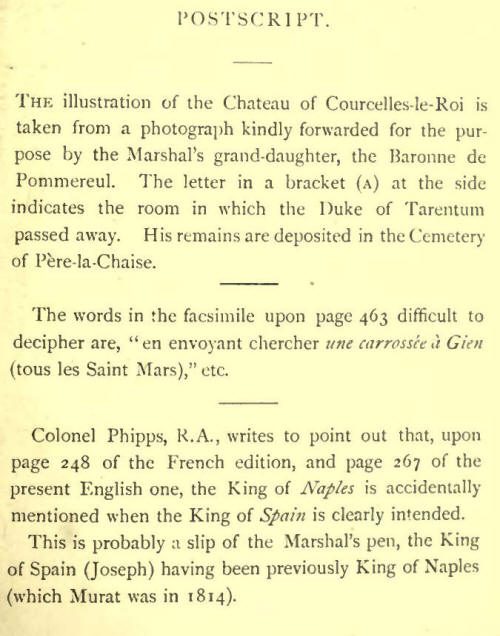
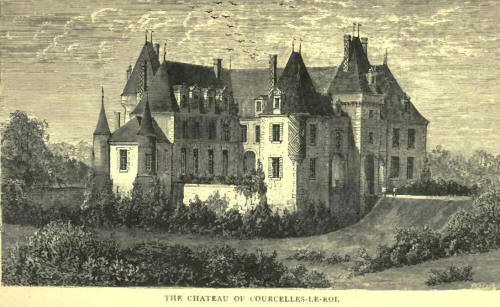
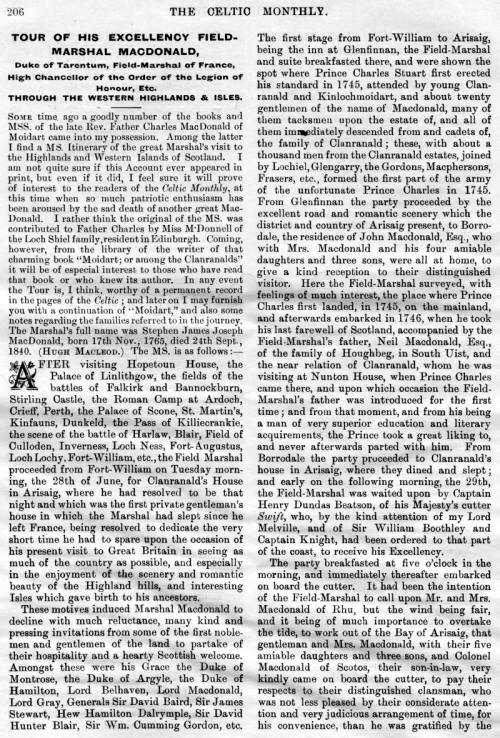
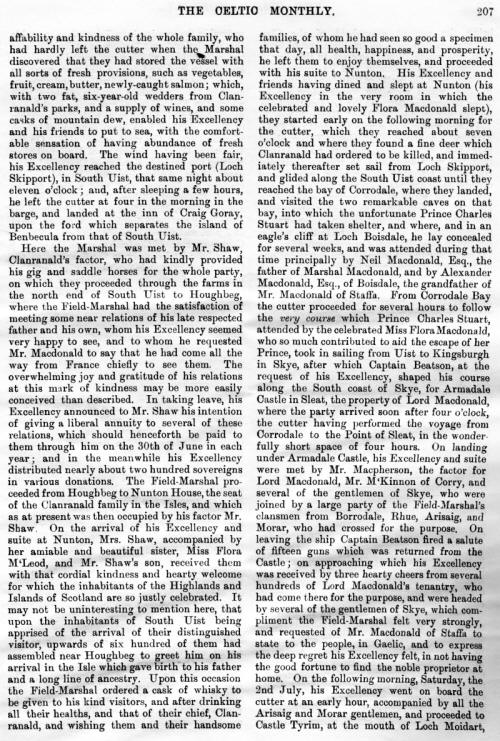
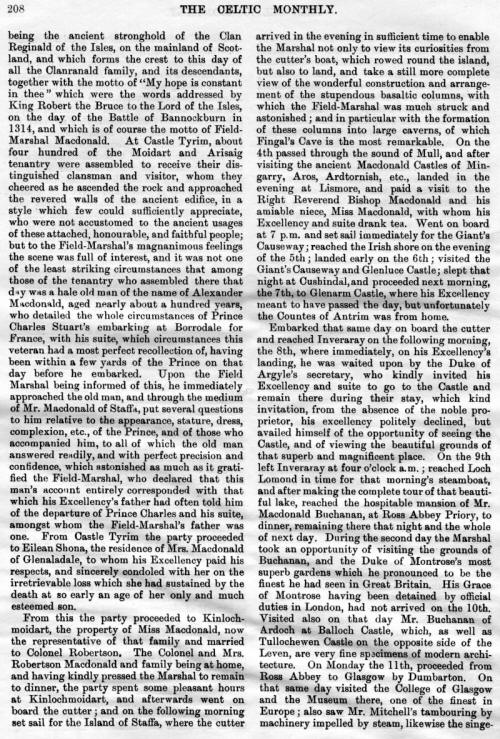
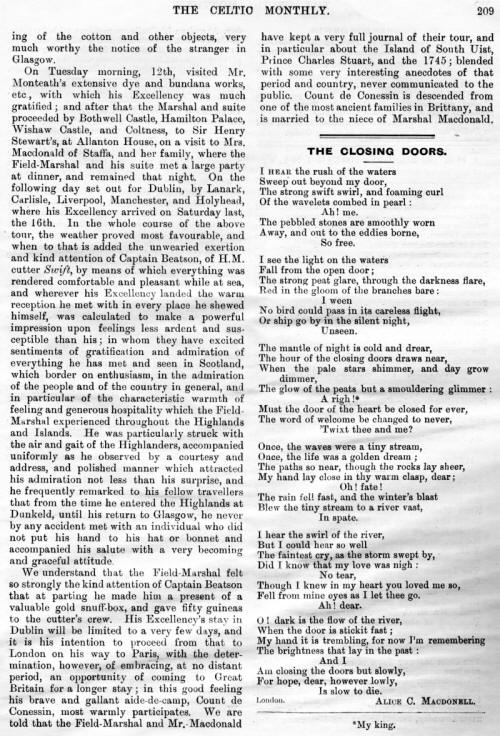 |

